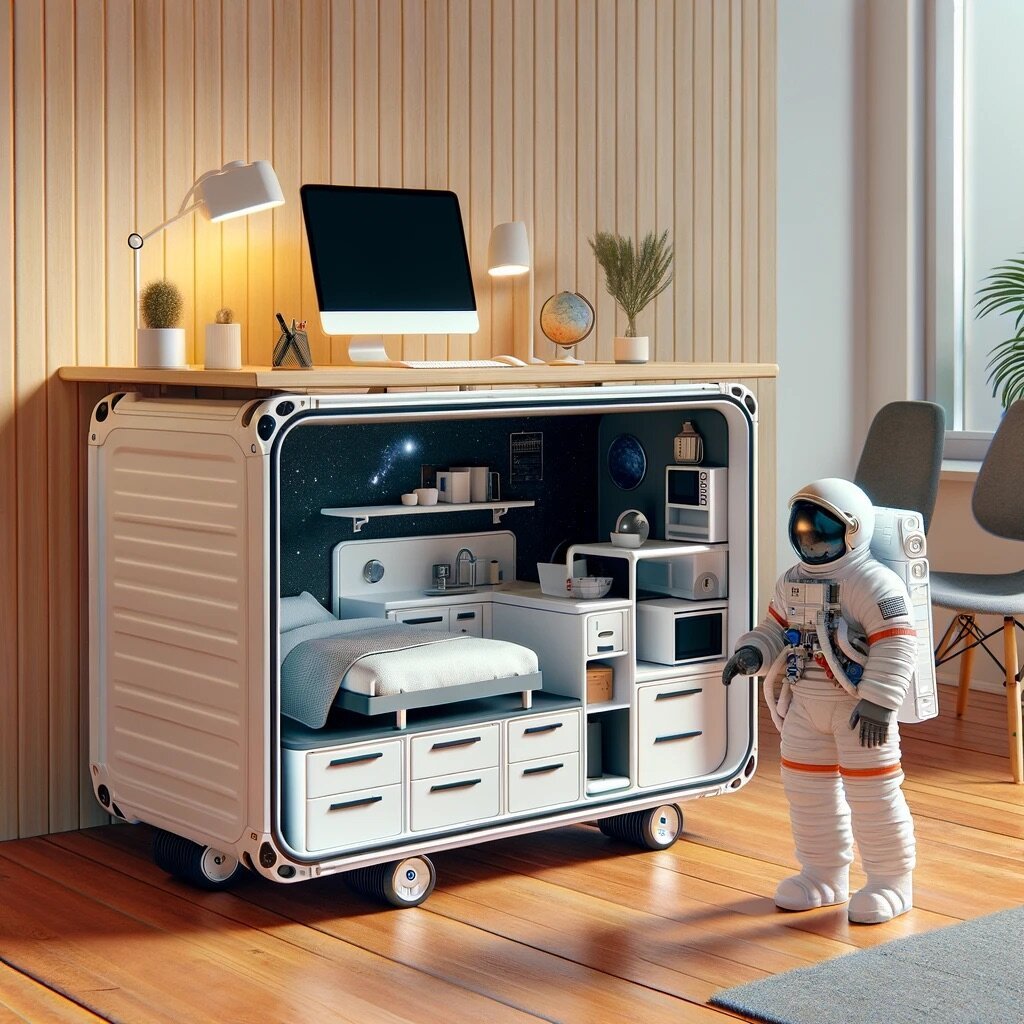The Galactic Desk Job

In the not-too-distant future, where space travel was as commonplace as taking a bus, there lived an astronaut named Max Starblazer. Max, known for his interstellar expeditions, found himself grounded due to the newest corporate policy at the Universal Exploration Co.:
Remote Work from Anywhere in the Galaxy,
which, ironically, meant a cramped cubicle on Earth.
Max was issued the latest fad in corporate ‘innovation’ – the RollPod 3000. It was a rollcontainer designed to fit under an office desk, supposedly embodying everything essential for living and working. Max couldn’t help but smirk at the irony – he who had navigated the vastness of space was now confined to a space smaller than a broom closet.
On his first day, Max wheeled in his RollPod, a compact abomination of a bed, kitchenette, and workspace crammed into a box. His fellow office astronauts gazed in bewildered amusement as he squeezed the contraption under his desk.
“Space exploration meets space-saving,”
Max quipped dryly, but his humor was lost in the sterile sea of the office.
Living out of the RollPod was a cosmic joke. Max awoke each morning, contorting out of the tiny bed, to face a day filled with virtual meetings. His backdrop: a dazzling nebula, a stark contrast to his reality under a desk, sandwiched between stacks of files and a potted plant. Lunchtimes were a peculiar spectacle. Max prepared meals fit for a spacecraft in his miniature kitchen, the scent of freeze-dried meals mingling oddly with office air fresheners. “Taco Tuesday, space edition,” he’d say, mustering a smile that didn’t quite reach his eyes. Days turned into weeks, and Max’s spirit waned. The RollPod, once a symbol of compact efficiency, now felt like a sarcophagus for his once boundless aspirations. The universe had shrunk, confined to the dimensions of his cubicle.
One day, amidst a haze of spreadsheets and deadlines, Max’s gaze drifted to the office window. He saw birds soaring freely, unconstrained, a painful reminder of his own clipped wings. He realized then that the vastness of space he yearned for couldn’t be replicated or replaced by a gimmick under his desk.
Embracing the absurdity, Max decided to make the best of his situation. He began decorating his RollPod with stickers from distant galaxies and photos from his expeditions. He replaced corporate memos with star maps and mission logs.
The RollPod became a mini-museum, a slice of the cosmos tucked under a desk. Colleagues started visiting his cubicle, not for reports, but for stories of distant worlds and nebulae. Max became not just an office worker, but an ambassador of the universe, teaching his earthbound peers about the wonders beyond.
In the end, Max Starblazer realized that while he couldn’t roam the stars, he could bring the stars to others. His RollPod, once a symbol of confinement, became a beacon of cosmic wonder amidst the humdrum of office life.
Max’s story, however, didn’t end with a grand epiphany or a triumphant return to the stars. Instead, it ended with a silent resignation letter left on a tidy, unremarkable desk. The RollPod was abandoned, a silent testament to a dream downsized and filed away.
Max walked away from the office that day, not with a sense of adventure, but with a profound sense of loss. The stars, once a playground, now seemed like distant, untouchable lights from the confining walls of his earthly existence.